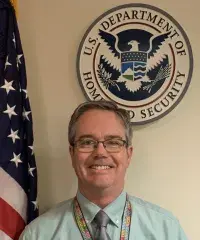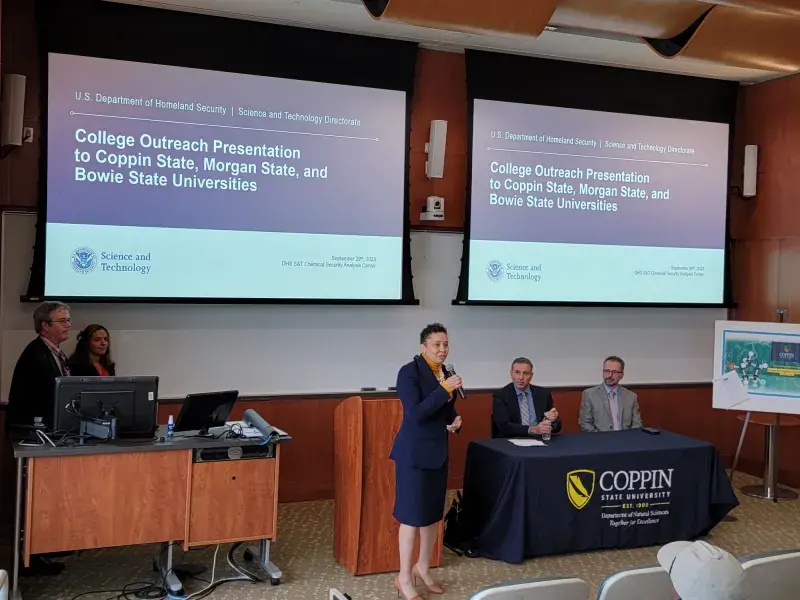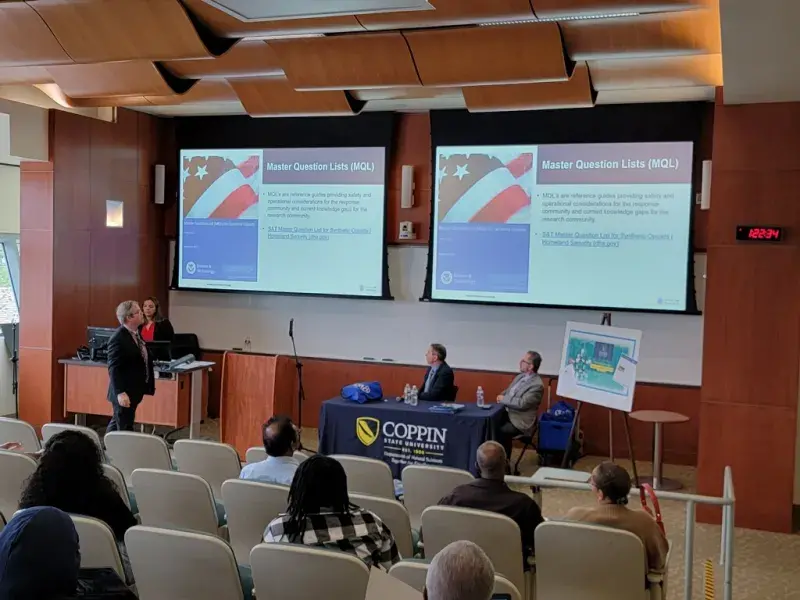National STEM Day guest post from Senior Scientist Dr. David Reed of the Science and Technology Directorate’s (S&T) Chemical Security Analysis Center (CSAC).

CSAC, located in Aberdeen, Maryland, is one of five S&T national laboratories, and it serves as the principal federal lab for assessing the threats and hazards associated with large scale chemical incidents or related acts of terrorism in the United States. We conduct studies and analyses and do the science that helps planners, emergency managers, and first responders using the best information and most effective technologies available—everything from food and agricultural defense to securing the Super Bowl. With a dedicated staff that brings 800 years of combined experience, we know our lab is only as effective as our people and the talent we retain and attract.
That’s why CSAC’s Innovation Team is always looking to the future, seeking ways to foster a new generation of leaders who will advance the lab’s research agenda and represent S&T amongst the greater scientific community. So, we started bringing the science directly to them, in the form of a college-level seminar that provides a holistic look at some of the lab’s key programs and knowledge products and encourages students to pursue similar careers.
CSAC had already sponsored student interns through S&T’s Homeland Security Professional Opportunities for Student Workforce to Experience Research (HS-POWER) program, and we benefit tremendously from working with young scientists in this capacity as they gain insights into the real-world applications of chemistry. But we recognized that we could do more to reach college and university students and early-career professionals. We found that this seminar is a great way to establish a deeper understanding of the lab’s work with young adults, career changers, veterans, and others at universities who may be interested in professional opportunities.

Highlighting the “S&T” in STEM
This past spring, one of our HS-POWER interns, Julianna Firek, who has since become a fulltime CSAC employee, helped pilot the seminar presentation at her alma mater, Duquesne University. During the seminar, we presented a dozen CSAC chemical security initiatives that benefit the nation, including our opioid threat prioritization work and S&T’s Master Question List for Synthetic Opioids, Jack Rabbit, technical assistance efforts, explosives threat and consequence modeling, and our Chemical Security Laboratory, among others.
Students who are interested in pursuing a career in public service, particularly at S&T, benefit from this exposure and can better see the value and fulfillment they may find in a federal career in Science, Technology, Engineering and Math (STEM) disciplines.
Making More Meaningful Connections
This fall, we expanded our outreach efforts by engaging with Minority Serving Institutions (MSIs), including local Historically Black Colleges and Universities (HBCU), to ensure there are opportunities for everyone to learn about the real-world homeland security applications of chemistry.
Our lab’s work is crucial to S&T in executing its mission. CSAC is actively helping S&T support the Department’s operational components in tackling the scourge of opioids, developing response and mitigation options when chemical threats and hazards loom, and understanding the real or potential impacts of hazardous chemical releases. In the seminars we have conducted thus far, we have found that students are surprised by the depth and breadth of our mission.
From traditional colleges and universities to MSIs to our service academies and the like, CSAC supports the DHS Inclusive Diversity Strategic Plan and is committed to expanding opportunities for students of all background to learn, grow, and serve the nation. Making these connections is necessary to support the DHS mission and helps ensure that the next generation knows S&T is a potential career destination.

Who Should Attend the Seminar?
The CSAC seminar is open to all college students interested in STEM career at DHS. We currently plan to schedule three to seven presentations, virtually or in person, each semester. Those who are focused academically on chemistry, biology, engineering, and mathematics, are encouraged to attend.
If you are interested in hosting or attending a CSAC seminar, please have your college's chemistry department contact csacinfo@st.dhs.gov.
